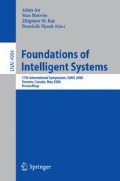Abstract
The inference of Explanations is a problem typically studied in the field of Temporal Reasoning by means of approaches related to the reasoning about action and change, which aim usually to infer statements that explain a given change. Most of proposed works are based on inferential logic mechanisms that assume the existence of a general domain knowledge. Unfortunately, the hypothesis to have a domain theory is a requirement not ever guaranteed. In this paper we face the problem from a data-driven perspective where the aim is to discover the events that can plausibly explain the change from a state to another one of the observed domain. Our approach investigates the problem by splitting it in two issues: extraction of temporal states and finding out the events. We applied the approach to the scenarios of Industrial Process Supervision and Medical Diagnosis in order to support the task of domain experts: the experimental results show interesting aspects of our proposal.
Access this chapter
Tax calculation will be finalised at checkout
Purchases are for personal use only
Preview
Unable to display preview. Download preview PDF.
References
Baron, S., Spiliopoulou, M.: Monitoring Change in Mining Results. In: Proc. of the Third International Conference on Data Warehousing and Knowledge Discovery (2001)
Espinosa, J., Vandewalle, J.: Predictive Control Using Fuzzy Models Applied to a Steam Generating Unit. In: International Workshop FLAIRS (1998)
Fisher, M., Gabbay, D., Vila, L.: Handbook of Temporal Reasoning in Artificial Intelligence. Foundations of Artificial Intelligence. Elsevier Science Inc., Amsterdam (2005)
Loglisci, C., Berardi, M.: Segmentation of Evolving Complex Data and Generation of Models. In: Proc. of the 6-th ICDM - Workshops (2006)
Malerba, D.: Learning Recursive Theories in the Normal ILP Setting. Fundamenta Informaticae 57(1), 39–77 (2003)
McCarthy, J., Hayes, P.J.: Some philosophical problem from standpoint of Artificial Intelligence. Machine Learning 4, 463–502 (1969)
Shahar, Y.: A Framework for Knowledge-Based Temporal Abstraction. Artif. Intell. 90(1-2), 79–133 (1997)
Shanahan, M.: Prediction is Deduction but Explanation is Abduction. In: Proc. of IJCAI conference, pp. 1055–1060 (1989)
Van Belleghem, K., Denecker, M., De Schreye, D.: Representing Continuous Change in the Abductive Event Calculus. In: ICLP (1994)
Author information
Authors and Affiliations
Editor information
Rights and permissions
Copyright information
© 2008 Springer-Verlag Berlin Heidelberg
About this paper
Cite this paper
Loglisci, C., Malerba, D. (2008). Discovering Explanations from Longitudinal Data. In: An, A., Matwin, S., Raś, Z.W., Ślęzak, D. (eds) Foundations of Intelligent Systems. ISMIS 2008. Lecture Notes in Computer Science(), vol 4994. Springer, Berlin, Heidelberg. https://doi.org/10.1007/978-3-540-68123-6_22
Download citation
DOI: https://doi.org/10.1007/978-3-540-68123-6_22
Publisher Name: Springer, Berlin, Heidelberg
Print ISBN: 978-3-540-68122-9
Online ISBN: 978-3-540-68123-6
eBook Packages: Computer ScienceComputer Science (R0)

